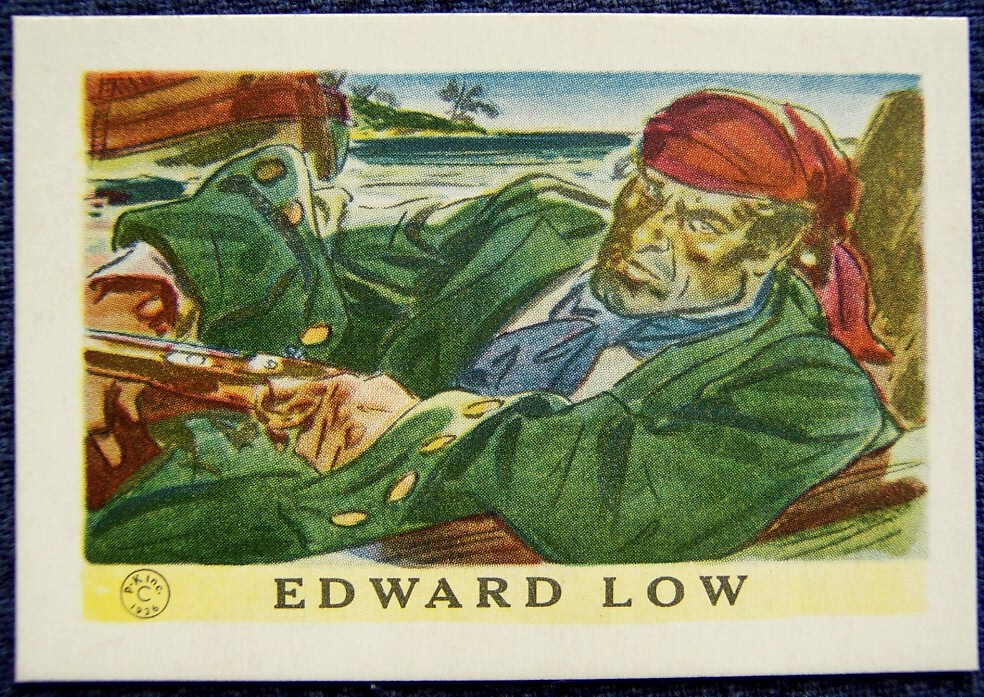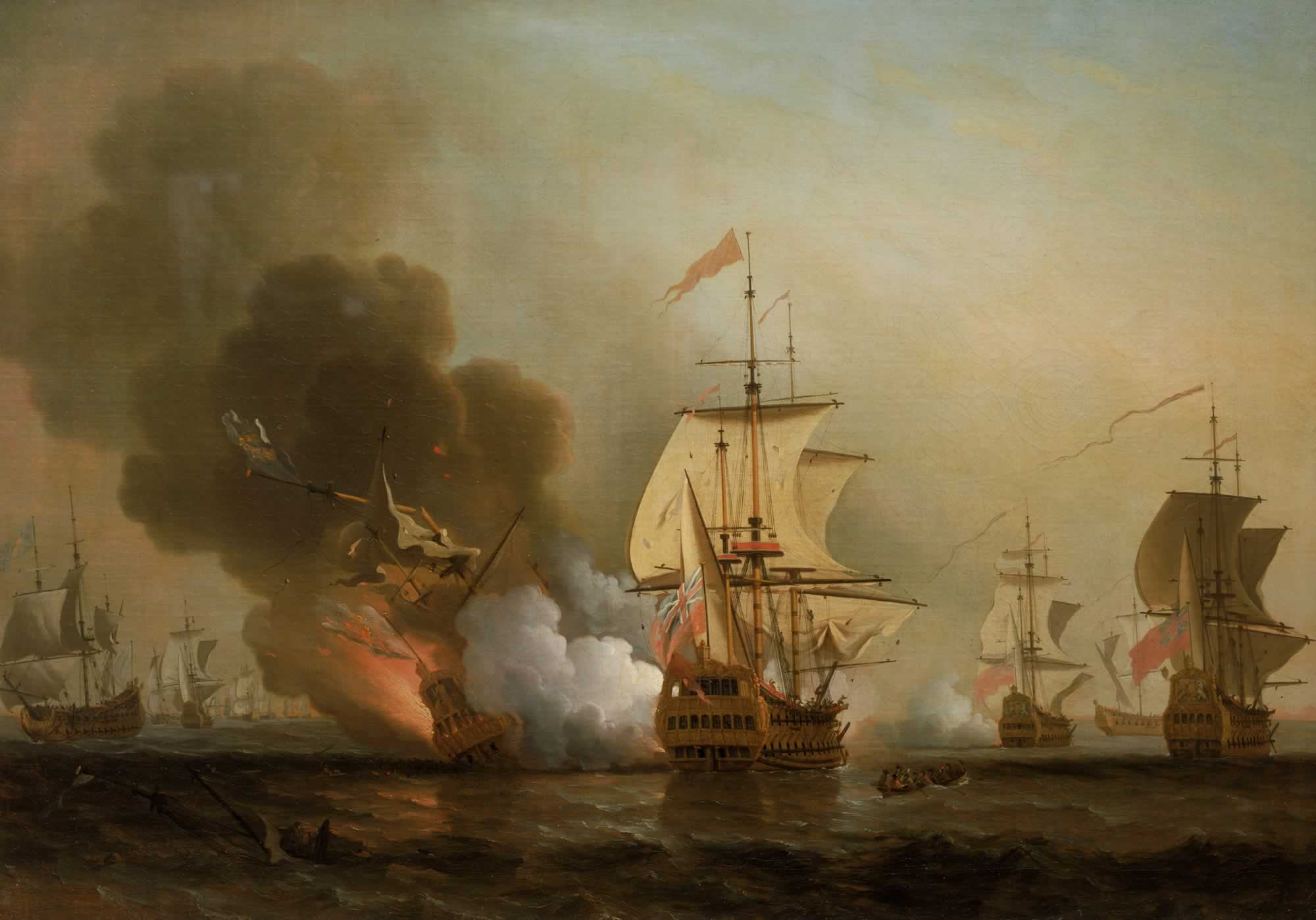|
Action Of 10 June 1723
The Capture of the schooner ''Fancy'' was a famous British victory over two pirate ships under Captain Edward Low. When off Delaware Bay Low attacked a Royal Navy man-of-war which he mistook for a whaler. The resulting combat lasted several hours and ended with the capture of one pirate vessel. In fact, the captured vessel was not the one named ''Fancy'' - factually, the combat should have been called "Capture of the sloop ''Ranger''." Background Edward Low was an eighteenth-century pirate from New England known for his extreme cruelty. He personally killed over fifty men and committed several atrocities such as forcing prisoners he captured to cannibalism. By summer of 1723 Low commanded the eighty-ton schooner named ''Fancy'' and was the most feared pirate in the Atlantic, so the British dispatched several warships on counter-piracy patrols. Accompanying ''Fancy'' was the sloop-of-war under Captain Charles Harris. ''Fancy'' was armed with ten guns and had a crew of forty ... [...More Info...] [...Related Items...] OR: [Wikipedia] [Google] [Baidu] |
Golden Age Of Piracy
The Golden Age of Piracy is a common designation for the period between the 1650s and the 1730s, when maritime piracy was a significant factor in the histories of the Caribbean, the United Kingdom, the Indian Ocean, North America, and West Africa. Histories of piracy often subdivide the Golden Age of Piracy into three periods: # The buccaneering period (approximately 1650 to 1680), characterized by Anglo-French seamen based in Jamaica and Tortuga attacking Spanish colonies, and shipping in the Caribbean and eastern Pacific. # The Pirate Round (1690s), associated with long-distance voyages from the Americas to rob Muslim and East India Company targets in the Indian Ocean and Red Sea. # The post-Spanish Succession period (1715 to 1726), when Anglo-American sailors and privateers left unemployed by the end of the War of the Spanish Succession turned en masse to piracy in the Caribbean, the Indian Ocean, the North American eastern seaboard, and the West African coast. Narrower def ... [...More Info...] [...Related Items...] OR: [Wikipedia] [Google] [Baidu] |
Post Ship
Post ship was a designation used in the Royal Navy during the second half of the 18th century and the Napoleonic Wars to describe a ship of the sixth rate (see rating system of the Royal Navy) that was smaller than a frigate (in practice, carrying fewer than 28 guns), but by virtue of being a rated ship (with at least 20 guns), had to have as its captain a post captain rather than a lieutenant or commander. Thus ships with 20 to 26 guns were post ships, though this situation changed after 1817. (See “1817 changes” in rating system of the Royal Navy.) Sea officers often referred to the post ships as frigates though technically the Admiralty scrupulously never described them as such. The vessels were frigate-built, with traditional quarterdecks and forecastles (the defining characteristic of post ships, distinguishing them from 20-gun ship-sloops), but, unlike true frigates, they lacked an orlop platform amidships. They had a high centre of gravity, which made them slow and ... [...More Info...] [...Related Items...] OR: [Wikipedia] [Google] [Baidu] |
Naval Battles Involving Great Britain
A navy, naval force, or maritime force is the branch of a nation's armed forces principally designated for naval and amphibious warfare; namely, lake-borne, riverine, littoral, or ocean-borne combat operations and related functions. It includes anything conducted by surface ships, amphibious ships, submarines, and seaborne aviation, as well as ancillary support, communications, training, and other fields. The strategic offensive role of a navy is projection of force into areas beyond a country's shores (for example, to protect sea-lanes, deter or confront piracy, ferry troops, or attack other navies, ports, or shore installations). The strategic defensive purpose of a navy is to frustrate seaborne projection-of-force by enemies. The strategic task of the navy also may incorporate nuclear deterrence by use of submarine-launched ballistic missiles. Naval operations can be broadly divided between riverine and littoral applications (brown-water navy), open-ocean applications (blu ... [...More Info...] [...Related Items...] OR: [Wikipedia] [Google] [Baidu] |
Piracy In The Atlantic Ocean
Piracy was a phenomenon that was not limited to the Caribbean region. Golden Age pirates roamed off the coast of North America, Africa and the Caribbean. Background Pirates and sailors are important in understanding how the Atlantic world looked and worked. Defying traditional alliances, attacking and capturing merchant vessels of all nations, pirates wreaked havoc on an emerging economic system, disrupted trade routes and created a crisis within an increasingly important system of trade centered on the Atlantic world.Marcus Rediker, ''Villains of all nations : Atlantic pirates in the golden age'' (Boston: Beacon Press, 2004). They were ready and willing participants in the exchange of people, ideas, and commodities around the Atlantic basin affecting the creation and destruction of communities.J.H. Elliot, ''"Atlantic History: A Circumnavigation," in The British Atlantic World'', 1500–1800, eds. Armitage, David and Michael J. Braddick (New York: Palgrave, 2002). Trade rout ... [...More Info...] [...Related Items...] OR: [Wikipedia] [Google] [Baidu] |
Naval Battles Involving Pirates
A navy, naval force, or maritime force is the branch of a nation's armed forces principally designated for naval and amphibious warfare; namely, lake-borne, riverine, littoral, or ocean-borne combat operations and related functions. It includes anything conducted by surface ships, amphibious ships, submarines, and seaborne aviation, as well as ancillary support, communications, training, and other fields. The strategic offensive role of a navy is projection of force into areas beyond a country's shores (for example, to protect sea-lanes, deter or confront piracy, ferry troops, or attack other navies, ports, or shore installations). The strategic defensive purpose of a navy is to frustrate seaborne projection-of-force by enemies. The strategic task of the navy also may incorporate nuclear deterrence by use of submarine-launched ballistic missiles. Naval operations can be broadly divided between riverine and littoral applications (brown-water navy), open-ocean applications (blu ... [...More Info...] [...Related Items...] OR: [Wikipedia] [Google] [Baidu] |
Nimbus Publishing
Nimbus Publishing is a publishing company based in Halifax, Nova Scotia. The company specializes in subjects relevant to the Atlantic Provinces. Until 2016, the company published an average of 35 to 40 new titles a year, but expanded its output to 55 titles in 2017. The company publishes in a broad span of genres including children’s picture and fiction books, non-fiction, history, nature photography, current events, biography, sports, and cultural issues. It is the largest Canadian-English language publisher east of Toronto. In 2005, Nimbus introduced a new fiction imprint called Vagrant Press. In 2012, owner John Marshall sold the company and general manager Dan Soucoup retired. Two employees, Terrilee Bulger and Heather Bryan, bought the company in order to prevent acquisition by a larger publishing house. In March 2018, the publishing house moved to a warehouse on Strawberry Hill Street in Halifax. At that time, a coffee shop and bookstore were added to the premises. ... [...More Info...] [...Related Items...] OR: [Wikipedia] [Google] [Baidu] |
Admiral
Admiral is one of the highest ranks in some navies. In the Commonwealth nations and the United States, a "full" admiral is equivalent to a "full" general in the army or the air force, and is above vice admiral and below admiral of the fleet, or fleet admiral. Etymology The word in Middle English comes from Anglo-French , "commander", from Medieval Latin , . These evolved from the Arabic () – (), “king, prince, chief, leader, nobleman, lord, a governor, commander, or person who rules over a number of people,” and (), the Arabic article answering to “the.” In Arabic, admiral is also represented as (), where () means the sea. The 1818 edition of Samuel Johnson's ''A Dictionary of the English Language'', edited and revised by the Rev. Henry John Todd, states that the term “has been traced to the Arab. emir or amir, lord or commander, and the Gr. , the sea, q. d. ''prince of the sea''. The word is written both with and without the d, in other languages, as w ... [...More Info...] [...Related Items...] OR: [Wikipedia] [Google] [Baidu] |
New York City
New York, often called New York City or NYC, is the most populous city in the United States. With a 2020 population of 8,804,190 distributed over , New York City is also the most densely populated major city in the United States, and is more than twice as populous as second-place Los Angeles. New York City lies at the southern tip of New York State, and constitutes the geographical and demographic center of both the Northeast megalopolis and the New York metropolitan area, the largest metropolitan area in the world by urban landmass. With over 20.1 million people in its metropolitan statistical area and 23.5 million in its combined statistical area as of 2020, New York is one of the world's most populous megacities, and over 58 million people live within of the city. New York City is a global cultural, financial, entertainment, and media center with a significant influence on commerce, health care and life sciences, research, technology, education, ... [...More Info...] [...Related Items...] OR: [Wikipedia] [Google] [Baidu] |
Newport, Rhode Island
Newport is an American seaside city on Aquidneck Island in Newport County, Rhode Island. It is located in Narragansett Bay, approximately southeast of Providence, south of Fall River, Massachusetts, south of Boston, and northeast of New York City. It is known as a New England summer resort and is famous for its historic mansions and its rich sailing history. It was the location of the first U.S. Open tournaments in both tennis and golf, as well as every challenge to the America's Cup between 1930 and 1983. It is also the home of Salve Regina University and Naval Station Newport, which houses the United States Naval War College, the Naval Undersea Warfare Center, and an important Navy training center. It was a major 18th-century port city and boasts many buildings from the Colonial era. The city is the county seat of Newport County, which has no governmental functions other than court administrative and sheriff corrections boundaries. It was known for being the locatio ... [...More Info...] [...Related Items...] OR: [Wikipedia] [Google] [Baidu] |
1936 Low Card
Events January–February * January 20 – George V of the United Kingdom and the British Dominions and Emperor of India, dies at his Sandringham Estate. The Prince of Wales succeeds to the throne of the United Kingdom as King Edward VIII. * January 28 – Britain's King George V state funeral takes place in London and Windsor. He is buried at St George's Chapel, Windsor Castle * February 4 – Radium E (bismuth-210) becomes the first radioactive element to be made synthetically. * February 6 – The IV Olympic Winter Games open in Garmisch-Partenkirchen, Germany. * February 10– 19 – Second Italo-Ethiopian War: Battle of Amba Aradam – Italian forces gain a decisive tactical victory, effectively neutralizing the army of the Ethiopian Empire. * February 16 – 1936 Spanish general election: The left-wing Popular Front coalition takes a majority. * February 26 – February 26 Incident (二・二六事件, ''Niniroku Jiken''): Th ... [...More Info...] [...Related Items...] OR: [Wikipedia] [Google] [Baidu] |







